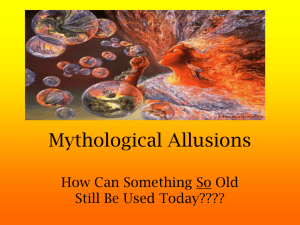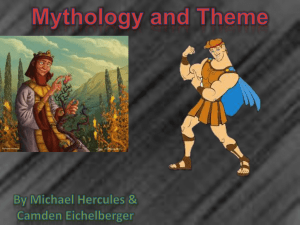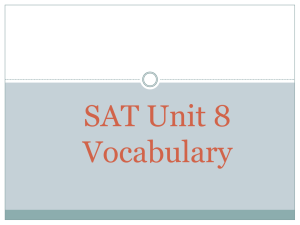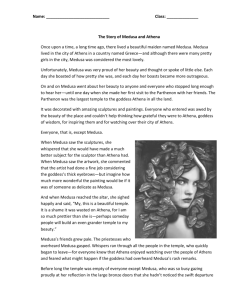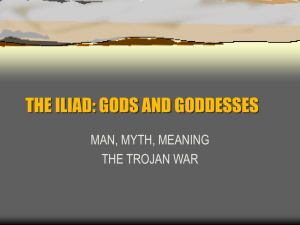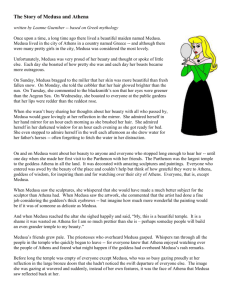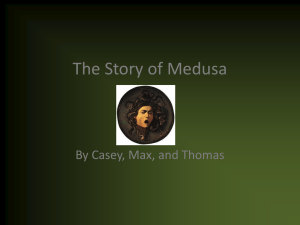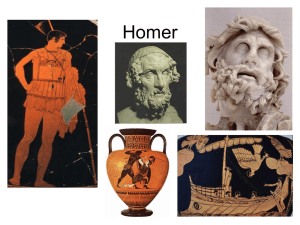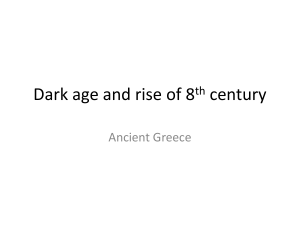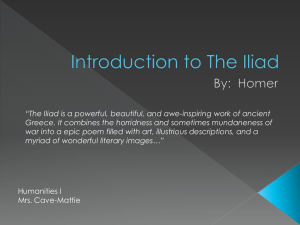Phrases in Greek Mythology
advertisement
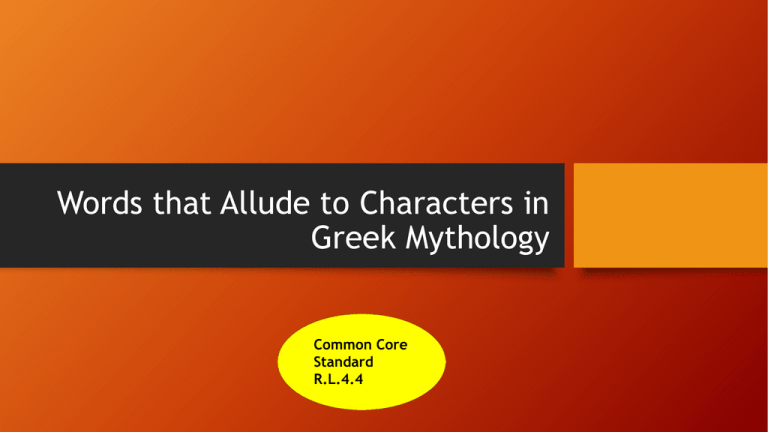
Words that Allude to Characters in Greek Mythology Common Core Standard R.L.4.4 Learning Objective Today, we will determine the meaning of words and phrases that are used in mythological stories. Mythological stories explain nature through characters with super natural powers Activate Prior Knowledge Have your ever heard of Cupid? Tell your partner what you know about Cupid. What power does cupid have? Cupid is known to cause people to fall in love in mythical stories. The word Cupid alludes to a person trying to make someone fall in love. Note: Allude is another way of saying refer to. Some stories are so well known that we refer to them in everyday conversations. The Midas Touch There once was a greedy man named Midas who only thought of collecting gold. One day he came across an old man who would grant him one wish. Without giving a second thought he said, “I wish that anything I touch will turn to gold.” With the wisp of his hand the old man gave him his magic touch. Everything Midas touched transformed to gold! This included his pillow, his shoes, and anything he could imagine. At dinner time though, Midas found that even his food turned to gold. Midas began to worry. His daughter then came running into the dinning room to give him a big hug. As soon as she touched him she froze into the shiniest lump of gold anyone had ever seen. Frustrated, Midas yelled to the heavens. King Midas… If someone says, “The poor boy turned out to have the Midas touch and became a millionaire by the time he was twenty-five.” “The Midas touch” means that a person is very lucky, or has the ability to be successful, especially the ability to make money easily. Importance Today, many people use words and phrases in conversations that allude to characters in mythological stories. Good readers are able to recognize them because they read stories to become familiar with these characters, words, and phrases. Tell about Pegasus in the following story. Pegasus Step 1 Read the passage. Step 2 Identify the character with super natural powers. Step 3 What words allude to this character? . Today… Sometimes a writer may say, “My Pegasus does not want to fly” The phrase alludes to the fact that their imagination does not want to take off. Allude is another way of saying refer to. Achilles Background Step 1 Read the passage. Step 2 Identify the character with super natural powers. Step 3 What words allude to this character? • The term “Achilles’ heel” refers to a person’s vulnerable spot or area. It is derived from the Greek myth of Achilles and his mother Thetis. • According to legend, when Achilles was born, his mother, in an effort to make him immortal, took Achilles to the Styx river and dipped him. She held him by one heel. The area where her fingers held him remained dry. As the heel was not touched by the waters of the Styx, it was the one vulnerable place on Achilles. • Achilles became the hero of many battles during the Trojan War. Paris, Prince of the Trojans, shot an arrow in the heel of Achilles. Because the heel was the one spot untouched by immortality, Achilles died. Today people allude to someone having an Achilles heel by saying they have a _________ spot. The Story of Medusa Step 1 Read the passage. Step 2 Identify the character with super natural powers. Step 3 What words allude to this character? • Once upon a time, a long time ago there lived a beautiful maiden named Medusa. Medusa lived in Athens, Greece. Although there were many pretty girls in the city, Medusa was considered the most lovely. • Unfortunately, Medusa was very proud of her beauty. Each day she boasted of how pretty she was and each day her boasts became more outrageous. Everyday she boasted to a different person about her beauty. • She went on and on like this until one day when she made her first visit to the Parthenon with her friends. The Parthenon was the largest temple to the goddess Athena in all the land. It was decorated with amazing sculptures and paintings. Everyone who entered was awed by the beauty of the place and couldn’t help but think of how grateful they were to Athena, goddess of wisdom, for inspiring them and for watching over their city of Athens. Everyone, that is, except Medusa. • When Medusa saw the sculptures, she whispered that she would have made a much better subject than Athena had. And when Medusa reached the altar she sighed happily, “It is a shame it was wasted on Athena for I am so much prettier than she is. • Whispers ran through all the people in the temple who quickly began to leave because they were afraid of what Athena might do if she heard Medusa’s remarks. A moment later, “Vain and foolish girl,” Athena said angrily, “You think you are prettier than I am! I doubt it to be true, but even if it were -- there is more to life than beauty alone. “Beauty fades, it does not comfort the sick, teach the unskilled or feed the hungry. And by my powers, your loveliness shall be stripped away completely. And with those words Medusa’s face changed to that of a hideous monster. Her hair twisted and thickened into horrible snakes that hissed and fought each other atop her head. Your face is now so terrible to behold that the mere sight of it will turn a man to stone.” Today, if you refer to someone or something by saying they are Medusa, What are you referring to? Pandora’s Box Step 1 Read the passage. Step 2 Identify the character with super natural powers. Step 3 What words allude to this character? • Once up a time, a long time ago, Zeus sent his new daughter, Pandora, down to earth so that she could marry Epimetheus, who was a gentle and lonely man. • Zeus was not being kind. He was getting even. Epimetheus and Prometheus were brothers. Zeus was mad at one of the brothers, Prometheus, for giving people fire without asking Zeus first. • Zeus gave Pandora a little box with a big heavy lock on it. He made her promise never to open the box. He gave the key to Pandora’s husband and told him to never open the box. Zeus was sure that Epimetheus' curiosity would get the better of him, and that either Epimetheus or his brother would open the box. • Pandora was very curious. She wanted to see what was inside the box, but Epimetheus said no. Better not. One day, when Epimetheus lay sleeping, Pandora stole the key and opened the box. Pandora… • Out flew every kind of disease and sickness, hate and envy, and all the bad things that people had never experienced before. Pandora slammed the lid closed, but it was too late. All the bad things were already out of the box. They flew away, out into the world. Today if you tell someone don’t open Pandora’s box, What are you referring to? Zeus Step 1 Read the passage. Step 2 Identify the character with super natural powers. Step 3 What words allude to this character? • Zeus was the god of the sky and ruler of the Olympian gods. He is lord of the sky, the rain god. His weapon is a thunderbolt which he hurls at those who displease him. He is married to Hera. He is also known to punish those that lie or break promises. • At his command the mighty thunder rolls, the lightning flashes, and the clouds pour rain. As the father of the gods, Zeus sees that each person performs his or her individual duty, punishes their bad behavior and solves their problems. As the all powerful god of all gods he watches over them. Hercules • Hercules is best known as the strongest of all mortals. Stronger than many gods. So strong he was the deciding factor in allowing the Olympians to win their battle with the giants. He was the last mortal son of Zeus. He possessed great strength. His chosen weapon was a massive club. If he held grudges, he would also do anything to help a friend. He was too strong for anyone to force a punishment on him. Terrible things happen to him because of Hera's hatred, a hatred that he is not responsible for. That he perseveres through it all. Today if you call someone Hercules, What are you trying to say about them? Today we determined the _______ of words and phrases in __________ stories. Name some mythological characters? What are their supernatural powers? Alluding means __________ to Independent Practice • Make a tree map with pictures and word cards • Measuring Up pages 59-62
